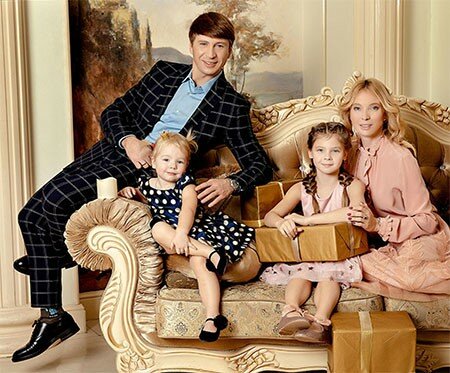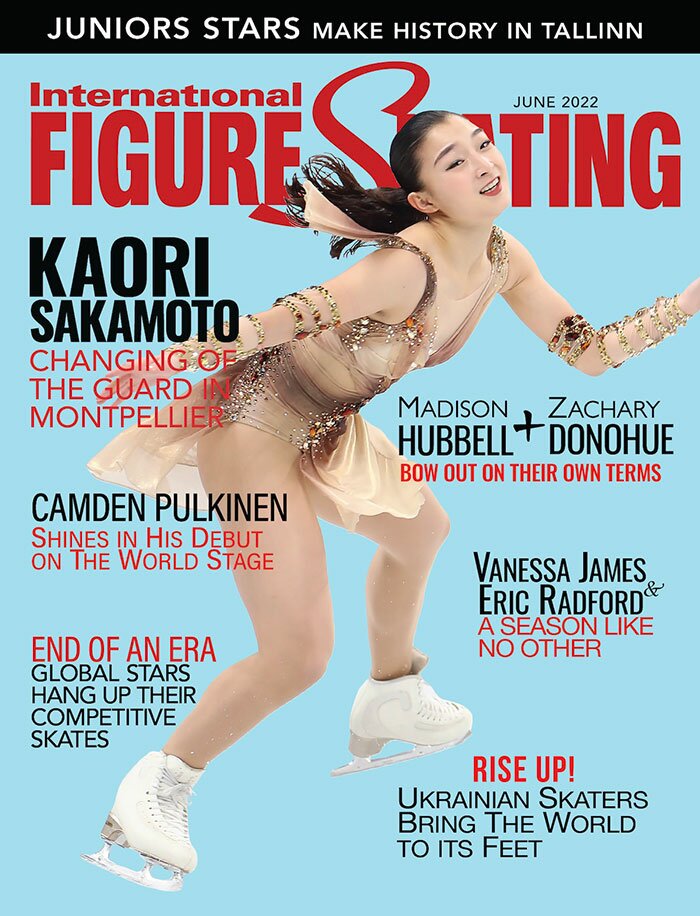
It has been 17 years since Russia’s Alexei Yagudin mined Olympic gold on American soil. So much has changed in the life of the decorated champion since that magical night in Salt Lake City.
At age 39, Yagudin has not lost the boyish grin that won over a legion of fans in his heyday, and he remains as ambitious today as he was when competing at the highest level of the sport.
Though figure skating still plays a major role in the life of Alexei Yagudin, it is just one of many professional pursuits on his busy agenda these days. From performing in ice shows to working with environmental and health groups, the four-time World champion has expanded his horizons in many directions.
As well, Yagudin has developed a career as a show host and a figure skating commentator for Russian television networks. His own show, “Live Life” — a sports-related program — airs on the national Channel One network on Saturdays.
Yagudin recently became involved with a wildlife protection group that is working to save the Amur (Siberian) tigers from extinction in Russia. He also participates in the Joint United Nations Program on HIV/AIDS, which he said is very important to him. He is in demand as a motivational speaker and shares his experiences and insights with students at Russian universities and institutions.
SHOWTIME
Aside from his regular television appearances, Yagudin spread his wings with his work on “Melting Ice,” a show in which he interviews athletes from many sports, including figure skating. The show was originally filmed in a studio but the format changed, and Yagudin now interviews his subjects in their own environment. “For example, one of the recent shows was with Marat Safin (a former world-class tennis player). We were playing tennis and talking,” Yagudin explained.
Earlier this year, he hosted Ilia Averbukh’s successful television production “Ice Age Kids” — a show he co-hosted with Evgenia Medvedeva in 2018 — in which children at the novice level perform artistic programs to various themes. A panel of prominent coaches and former elite skaters judge the routines.
Yagudin developed a passion for acting in stage plays a few years ago, and said he likens the experience of performing live to his competitive days. “I really like television, but there is always the chance for a retake,” he said. “In the theatre there is no such thing. Theatre is like a European or World Championships when it comes to adrenaline. That feeling cannot be replaced.”
Last spring, he had starring roles in two comedic plays that premiered in St. Petersburg. “The first one was about a real- life relationship between two people, in which I performed with Anna Gorshkova (a well-known Russian actress).
“The second was a lighter comedy about how a person changed in one evening. The plays will eventually tour in Russia, Belarus and also in Canada. The hardest thing is the scheduling. The theatre wants to book me now for February and March, but I don’t know if I will have time since there are tours with Ilia (Averbukh) and I’d like to commentate at the European and World Championships.”
EVOLUTION & DEVELOPMENT
Through his work as a television commentator, Yagudin has kept up with the sport and has closely watched the evolution that figure skating has undergone since his era. “Obviously, the gap is huge between the time when I competed and now, but there is development, thank God,“ he said. “The 2019 World Championships in Japan impressed me immensely. Not just the men — everyone.”
Yagudin said he found Worlds to be an emotional experience and it took him a long time to recover from it. “I was crying and it was hard for me to speak during the coverage — I had to pinch myself to say something. I am a rather dry and calm person, but emotionally this was something extraordinary and really cool. The development of skating is continuing and I am convinced I’ll live to see quintuple jumps.”
He is also impressed that female skaters are now executing quadruple jumps and said he has no doubt they will do all the quads within the next 10 to 15 years. “Now, people are asking how is that possible, but let’s remember how it was 20 years before our time. Skaters started to do triples, and didn’t even yet attempt a triple Axel and everyone was saying, ‘Wow! Triple jumps — what else is there to come?’ Before that they did only doubles, so time is passing and this is just an absolutely normal development.”
Yagudin is also committed to advancing the sport in his own way. In June, he opened an ice skating center in Minsk, Belarus, and has plans to set up others in Moscow later this year. The three-time European champion is focused on organizing and establishing a system in these schools with the trusted team he has in place.
“I will work there, too, but I am not someone who will stand there and do the same thing day in and day out,” said Yagudin. “I will build a system together with people I trust, and where everyone is going in the same direction. It won’t happen that one says one thing and when I go there I say something different. I am always working with people that think in a similar way as I do.”
BEYOND SKATING
Yagudin and his wife Tatiana Totmianina, 37 — the 2006 Olympic pairs champion with Maxim Marinin, with whom she still performs in shows — are proud parents of two daughters, Elizaveta, 9, and Michèle, 3. Yagudin said they are planning to have a third child in the near future. “And not to forget — nobody has cancelled my job as a father,” Yagudin added. “Actually, Tatiana, for some reason, would like to have twins, so we have four kids. I say no. Let’s have three for now.”
Married in 2016, the couple has never encouraged their daughters to follow in their footsteps. For the girls, skating is just a recreational pursuit their parents have combined with many other hobbies. Ensuring that their daughters are well educated is more important to Yagudin and Totmianina. “The older one is like me — she does not want to do anything,” Yagudin said with a laugh. “But the younger one is very active, she is dancing all the time.”
When the World Figure Skating Hall of Fame called to notify Yagudin of his induction in 2017, he said he did not feel anything special. “I said, ‘I have two daughters, I have dogs, I also have different professions that I am doing now and others that I am pursuing.’ Figure skating will end for me sooner or later — I would rather sooner than later.”
A congenital hip disorder forced Yagudin to call an early end to his competitive career in the fall of 2002. Although he wanted to continue competing and “really loved those competitions, I am not disappointed that it ended rather early. This is probably a good description. It was a very bright chapter with victories and defeats, smiles and tears — but this is all so far in the past,” the 2002 Olympic champion explained.
When asked about his career highlights, Yagudin said that he no longer thinks much about that era. “My life, or the life of any person, is a book and in every book there are chapters. Naturally, the first chapter is school and sports. Obviously, the biggest mark was probably the victory at the Olympic Games. I would hardly say that the victory at the World Junior Championships was the most important one in my life. Of course, it was the Olympic gold medal. And that’s it. At the time, I was sad that I had to retire from competitive skating. Obviously, at first it was hard to accept that I had to stop, but I couldn’t do anything about it because I was in a lot of pain.
“I had achieved the maximum and Anton Sikharulidze, the 2002 Olympic pairs champion (with Elena Berezhnaia), was right to say at the time, ‘don’t be afraid to change something in your life. Don’t stand still, but move forward all the time. You don’t have to be afraid of changing something. If you move on, life gives you other opportunities.’
“Now time has passed and, as life shows, so many other things have come my way. I am a happy person and I probably don’t regret anything that has happened in my life. Therefore, I am now quite calm about these changes. Eventually, you realize that something else lies ahead and if you have the desire to do something, you’ll get the opportunity for sure.
“Nevertheless, when you’ve been doing something and loved doing it for many years, you are afraid to lose it. I realize now, at age 39, that I might have lost my legs, but I have my head.”
He recently performed in Averbukh’s acclaimed on-ice production of Bizet’s “Carmen,” playing a double role as the toreador, Escamillo, who falls in love with the heroine of the opera, and the “evil fate” (which is not a role in the original opera but was added by Averbukh in his production). In 2018, Yagudin played the role of Mercutio in Averbukh’s on-ice musical, “Romeo and Juliet.”
Yagudin admits that he is sometimes tired of skating and the pain he experiences these days. Though he still executes triple toes in shows, the toll the sport has taken on his body is evident when he limps after leaving the ice. “It is a vicious circle because as a singles skater I have to jump — I cannot just skate and wave my arms. This would be embarrassing for me. So, I need to train, but I can’t train because I’m constantly in pain,” the two-time Grand Prix Final champion explained.
He would like to continue performing until the 2022 Olympic Games, after which he plans to focus on his television and theatre work. “Ten years ago, I could go out and jump as if it was nothing, even without training. Now my wife tells me: ‘Lesha, you are 39 years old. It doesn’t work that way — you need to train.’ I always say in interviews I’ll skate as long as I can. However, the moment to stop is around the corner.”
(Originally published in the October 2019 issue of IFS)




